Tag Archives: African Revival
Posted on November 11, 2015 by Sophie Hicks
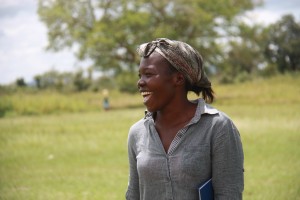
Babra Akello, aged 27, is African Revival’s Agricultural Project Officer. Here, Babra gives us an insight into the progress of the School Demonstration Garden project, including the benefits and challenges of the project, and some uplifting success stories that she has witnessed while working closely with the parents and students.
Looking at the situation where our beneficiaries are, I feel the SDG has come as a solution to the problems that our rural schools face. Because looking at the rural schools, parents are so far away from the school, parents are not always willing to contribute to the development of the school, so the school management and the head teachers have to pull ropes with the parents. When it reaches the time of examinations, pupils have not paid, but the school has to buy chalks, reference books etc. But the SDG brings parents closer to the school, opening their eyes to the school and contributes towards the development of the school.
And by them coming to the school, they are not just coming to work on the project, but they are coming to check on the progress and education of their children. And this follow-up for any other parents who are not involved is hard to do. And then it is benefiting them because as they come to work, they are learning different knowledge in agricultural practices, in saving the money, in actually planning for their home, and actually finding appropriate solutions to their household problems.
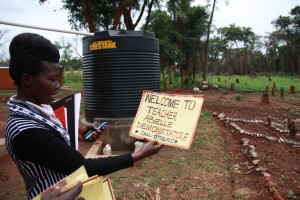 Also in a way, its even helping the communities to wipe away gender based violence. You know, most times, if all the family, the husband and wife are involved in the project, this means that they are going to listen to such messages. Because as we train them, there are crosscutting issues that I as a technical person, I do touch. On top of what the project wants from us, after training in the good agricultural practices, after doing the VSLA, there are issues of gender based violence, of HIV prevalence that we always touch upon. So in a way, the parents are all benefitting, and when they get home, they can’t now fight in their house, they can now sit together and plan for their home, plan for their education of their children.
Also in a way, its even helping the communities to wipe away gender based violence. You know, most times, if all the family, the husband and wife are involved in the project, this means that they are going to listen to such messages. Because as we train them, there are crosscutting issues that I as a technical person, I do touch. On top of what the project wants from us, after training in the good agricultural practices, after doing the VSLA, there are issues of gender based violence, of HIV prevalence that we always touch upon. So in a way, the parents are all benefitting, and when they get home, they can’t now fight in their house, they can now sit together and plan for their home, plan for their education of their children.
The agricultural practices that they learn, when they replicate at their household level, they are going to increase on their production. This means they are going to have surplus food at a household level, where they can have enough to eat, where they can have enough to keep, where they can have enough to sell and cater for other basic needs. They will be in the position to pay school fees, buy scholastic materials.
So far I would say that the project is progressing fast looking at the level we have reached. We have sensitized, we have formed the groups, we have initiated the SDGs, we have already got some harvest from the garden. And also the most interesting thing, you know the people we train, there are people who are fast learners, people who are medium, people who takes time to understand. And the most interesting part is that the fast learners have already even got to the level of replicating what they have learned form the SDG at home. So to me, that is already progress in the project.
As a good trainer, much as there are fast learners, you concentrate most on the medium and slow learners, so they can catch up with the fast learners. So like with the parents group, we cannot now say we are going to push them push them – what you do, each and every time you give assignments, today we’ve learned this, and next week people should begin replicating, and when you are looking out for who has replicated, you start out with the slow learners, asking ‘have you done this’ in a good way because you don’t have also to make them know that they are slow in learning. You just use your facilitating talents to make them also understand and slowly slowly, they will also come to understand.
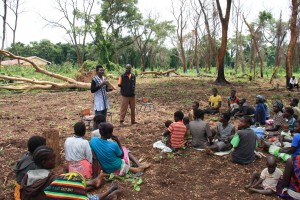 One of the challenges of the SDG is the issue of land dispute. You know, land issues in the Acholi region are not something easy, especially in Langera. During the project launch in the district, one of the committee members of the school just stood up boldly and said ‘I don’t think this project is going to work because in Langera we don’t have so much land’. And that school was already assigned to me, so I felt like ‘how am I going to overcome this?’. But something came into my mind that ‘no you go on, and do what you’re supposed to do, and maybe it can turn out to be a success story’. And when I went for the mobilisation, I found the head teacher who told me, ‘you know what, you don’t have to fear, you just come, the school is there, we are going to work together, and overcome these land issues, and what we are going to do, we are going to sit with these management committees, and make sure we apportion the SDG site to be on the other side where they are wrangling over”. So the parents came, and I used my tricks with the parents to ensure that we succeeded. And the parents were on my side, everything went well, and right now Langera stands to be a success story because there are no more land wrangles, and when the bestseller donor came, the chairperson of the SMC even highlighted that as a success – that the SDG has enabled us to solve the land issues that were in the school. So that wasn’t easy to reach the level we have now.
One of the challenges of the SDG is the issue of land dispute. You know, land issues in the Acholi region are not something easy, especially in Langera. During the project launch in the district, one of the committee members of the school just stood up boldly and said ‘I don’t think this project is going to work because in Langera we don’t have so much land’. And that school was already assigned to me, so I felt like ‘how am I going to overcome this?’. But something came into my mind that ‘no you go on, and do what you’re supposed to do, and maybe it can turn out to be a success story’. And when I went for the mobilisation, I found the head teacher who told me, ‘you know what, you don’t have to fear, you just come, the school is there, we are going to work together, and overcome these land issues, and what we are going to do, we are going to sit with these management committees, and make sure we apportion the SDG site to be on the other side where they are wrangling over”. So the parents came, and I used my tricks with the parents to ensure that we succeeded. And the parents were on my side, everything went well, and right now Langera stands to be a success story because there are no more land wrangles, and when the bestseller donor came, the chairperson of the SMC even highlighted that as a success – that the SDG has enabled us to solve the land issues that were in the school. So that wasn’t easy to reach the level we have now.
Schools are experiencing land disputes, because initially in the rural communities, somebody will just come willingly and give out land for the school. And at times they go into signing maybe an agreement that I am giving this portion of land. But eventually the person dies and either the children or the grandchildren now begin disturbing the school, and also most of the schools do not possess a land title, so such issues makes conflicts to always arise.
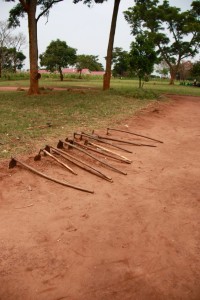 One of my favourite moments of the project was in Layima Primary School. Layima has been a school where the parents are so so much interested in the project; their numbers have been overwhelming. When you take a project in the community, the expectations are always so high, but we have a budget line that we are supposed to operate within, and it can look quite challenging. At Layima, especially the tools for the beneficiaries – at first this looked like it was a challenge because the numbers were up to 80 members, but there were only 47 hoes. My favourite moment came when we had to sit down with the parents and make them understand that this other support, the tools are just brought to ensure that work starts, but they themselves have to own the project, and if they are willing they can even contribute towards the project by coming with their hoes. And it was an amazing moment when the members agreed that ‘lets first put these hoes intact and use our own hoes’. Even up to now, we’ve not distributed the hoes, and the parents are thinking of giving them to the school, so that the entrepreneurship club can be using it. That was my favourite moment because it felt challenging but a solution was derived.
One of my favourite moments of the project was in Layima Primary School. Layima has been a school where the parents are so so much interested in the project; their numbers have been overwhelming. When you take a project in the community, the expectations are always so high, but we have a budget line that we are supposed to operate within, and it can look quite challenging. At Layima, especially the tools for the beneficiaries – at first this looked like it was a challenge because the numbers were up to 80 members, but there were only 47 hoes. My favourite moment came when we had to sit down with the parents and make them understand that this other support, the tools are just brought to ensure that work starts, but they themselves have to own the project, and if they are willing they can even contribute towards the project by coming with their hoes. And it was an amazing moment when the members agreed that ‘lets first put these hoes intact and use our own hoes’. Even up to now, we’ve not distributed the hoes, and the parents are thinking of giving them to the school, so that the entrepreneurship club can be using it. That was my favourite moment because it felt challenging but a solution was derived.
Another amazing moment was in Abera p/s. During the formation, this group had the highest expectations, more than any other group. With the trainings and mentorship, they turned out to be the best group via production and they are a group of 55 members only, but they are quite hardworking. And as I talk now, they are still leading in the production record. For the first season, they have actually got 1.7 million out of their production, and we are expecting more for the second season. So that actually amazed me, because looking at that, it makes me feel like the effort, my travel there, my trainings, has yielded fruits. So it gives me happiness.
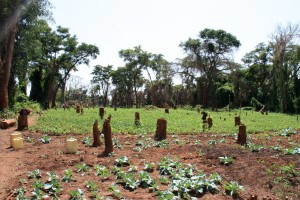 I hope that the project will achieve all its objectives. Looking at the objectives of bringing the parents closer, increasing the retention rates of the pupils in school, ensuring the school feeding program, increasing productivity – with the speed we are going, I hope we will achieve all the objectives.
I hope that the project will achieve all its objectives. Looking at the objectives of bringing the parents closer, increasing the retention rates of the pupils in school, ensuring the school feeding program, increasing productivity – with the speed we are going, I hope we will achieve all the objectives.
Posted in News |
Tagged African Revival, Uganda |
Leave a comment
Posted on November 10, 2015 by Sophie Hicks
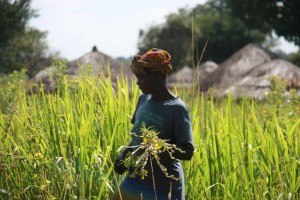 At Olaa Amilobo Primary School, the Parent’s group has been working hard for the last four months. As part of the School Demonstration Garden project, implemented by African Revival in partnership with the Bestseller foundation, they planted simsim (sesame) and have carefully nurtured it over the last few months, protecting it from the destructive path of stray animals and irrigating it during the prolonged drought that affected Amuru district. And now it is time for the harvest. This photo essay documents a day of the harvest, showing the different stages of the process, as well as the group and its individual members. We hope you enjoy it!
At Olaa Amilobo Primary School, the Parent’s group has been working hard for the last four months. As part of the School Demonstration Garden project, implemented by African Revival in partnership with the Bestseller foundation, they planted simsim (sesame) and have carefully nurtured it over the last few months, protecting it from the destructive path of stray animals and irrigating it during the prolonged drought that affected Amuru district. And now it is time for the harvest. This photo essay documents a day of the harvest, showing the different stages of the process, as well as the group and its individual members. We hope you enjoy it!
Photo essay: https://shicks.exposure.co/harvest-time
Posted in News |
Tagged African Revival, Garden, Harvest, Photo essay, Uganda |
Leave a comment
Posted on September 24, 2015 by Sophie Hicks
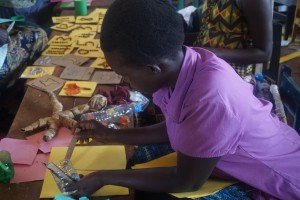 When we visited the classrooms at Anaka Primary 7, every inch of wall space was occupied by colourful learning aids depicting letters, numbers and local folk tales. The school was hosting an African Revival Jumpstart! training workshop for teachers from local nursery schools that focused on:
When we visited the classrooms at Anaka Primary 7, every inch of wall space was occupied by colourful learning aids depicting letters, numbers and local folk tales. The school was hosting an African Revival Jumpstart! training workshop for teachers from local nursery schools that focused on:
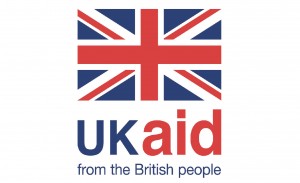
- How to make learning aids from raw local materials at nursery level
- Using learning resources in the local Acholi language
The participants learned how to source raw materials from the natural environment and use them to make a variety of educational equipment in the local Acholi language.
Local materials are an incredibly cheap source of learning aids, and also familiar to the children, which helps to facilitate their understanding of new concepts. Teacher trainer Martina explained how using learning aids made of local materials can help children to master their environments:
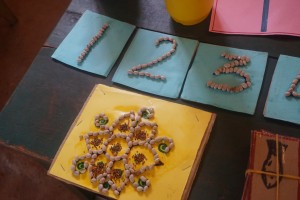
‘The children develop a precision for what is in their environment. When they see a pot made of clay, they know what clay is called, they begin to value and appreciate their environment and later they can also develop skills in making those materials themselves, helping them professionally later on.’
Furthermore, nursery-teaching resources written in the local Acholi language enhance the students’ learning because it is the language they use at home.
The language of instruction throughout the schooling system in Uganda is English. However, research confirms that children learn best in their mother tongue as a prelude to bilingual education because it allows them to develop stronger reading, writing and mathematical skills. This lays the foundations for their future education and acquisition of more complex concepts. Moreover, using Acholi language materials can boost the self-confidence and motivation of pupils and increase their interest in what they are learning – because they understand it! Martina described the benefits of using Acholi learning aids:
‘Firstly, the children in the nursery schools are still developing their language and still using the local language at home. So we hope that, when they come to school and get materials in the local language, they will develop their language skills fast because they understand it. At home we call a pot ‘agulu’ – when they come to school they also find ‘agulu’, so they develop reading and writing skills faster.
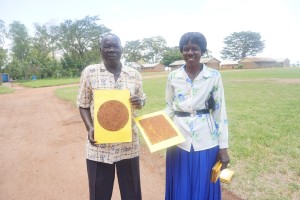
But teacher trainer Ojok Ojara, who underwent two years of ECD teacher training in Australia, admits there are some challenges persuading the local communities of the benefits of teaching nursery and primary classes in Acholi:
‘People think that when you teach in Acholi, you are not teaching in English. But you can teach in both! Let the children develop the language they really use at home, let them master it. They will learn the second language very quickly.’
Ojok Ojara is now advocating for the introduction of English only after children have completed class 3 of primary school, aged 8. Indeed, children who have a firm grounding in Acholi and have been given the opportunity to develop skills and conceptual understanding in their mother tongue, will learn English quicker than children who have been instructed purely in English. In addition, they are more empowered as learners when taught in their mother tongue, which they can now study all the way to university level in the Ugandan education system
The African Revival training focused on the importance of the use of Acholi in the classroom, while also showing participants practical ways of incorporating the language into the classroom using handmade learning aids. Trainers Martina and Ojok Ojara expressed their firm hope that the teachers would take away the new techniques and adapt them to their own classrooms, and plan to monitor their progress. But the level of motivation amongst the trainees is high. When asked if he enjoyed the training sessions, nursery teacher Kuluse admitted:
‘Yes! In fact yesterday I didn’t sleep. I spent most of the night working on my learning aids, because I thought I will make a lot of things that will help me in class, so I’ve really achieved a lot in this training.’
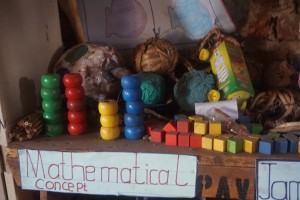 We hope he doesn’t stay up every night making new resources – teaching is a tiring job! Kuluse is clearly very passionate continuing professional development for teachers, which he sees as the key to raising education standards in Uganda, and hopes to share his new knowledge with his colleagues. He also views Early Childhood Development as integral to his nation’s progress:
We hope he doesn’t stay up every night making new resources – teaching is a tiring job! Kuluse is clearly very passionate continuing professional development for teachers, which he sees as the key to raising education standards in Uganda, and hopes to share his new knowledge with his colleagues. He also views Early Childhood Development as integral to his nation’s progress:
‘Nursery education is the foundation of our nation. If the foundation is built well, our dreams for Uganda will all come to pass’
With more and more Acholi being introduced into nursery education, in conjunction with vibrant, engaging and locally sourced learning aids, we are sure this foundation is growing stronger by the day.
Posted in News |
Tagged African Revival, ECD, Education, International Development, Nursery School, Uganda |
Leave a comment
Posted on September 18, 2015 by Elaine Miller
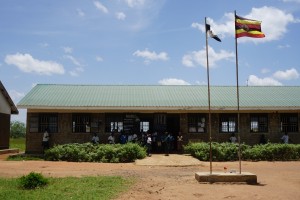 Our Education Jumpstart! team is currently busy conducting Centre Development
Our Education Jumpstart! team is currently busy conducting Centre Development
Plan workshops, in which CMC (Centre Management Committee) members, PTA
(Parents-Teacher-Association) members, SMC (School Management Committees) members and caregivers are trained in developing a Centre Development Plan (CDP) for
their ECD centre. Last week, a two-days workshop was held at St Kizito Bidati Nursery School. With all parties attending, there were 10 enthusiastic and willing ‘learners’, eager to develop a 3-year-plan with one main goal: Quality Education!
The workshop followed three clearly defined objectives:
- Understand planning in the context of Centre Development Plan
- Identify areas that can be considered in that plan
- Understand the steps involved in the development plan
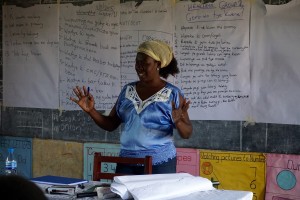 The key word for these workshops is empowerment: We help and guide them through the process of developing their Centre Management Plan by giving them incentives, asking questions and providing some constructive assistance when needed – but it is our participants that come up with concrete ideas which will then translate into their own, individual, customised Centre Development Plan! Right from the start, it is especially important to our Education Programme Coordinator Richard for everyone to realise how quality education can be achieved:
The key word for these workshops is empowerment: We help and guide them through the process of developing their Centre Management Plan by giving them incentives, asking questions and providing some constructive assistance when needed – but it is our participants that come up with concrete ideas which will then translate into their own, individual, customised Centre Development Plan! Right from the start, it is especially important to our Education Programme Coordinator Richard for everyone to realise how quality education can be achieved:
“A lot of school development plans focus on improving infrastructure. However, that doesn’t always have to translate into quality education! Teachers, for example, are much more essential – whatever you invest in their training and development will provide quality education!”
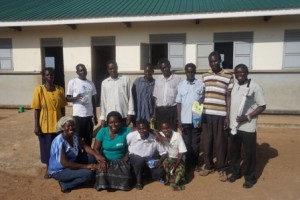 The participants at St Kizito Bidati quickly understood that quality education can only be achieved through a multifaceted approach. This is why, on DAY I, they identified four key areas which their CDP shall focus on: First of all, special emphasis shall be put on (1) ‘Curriculum delivery’ – This means it’s all about the teachers, their training, refresher workshops and adequate materials, but also their motivation from the parents. Here, Julius, a CMC member, stresses
The participants at St Kizito Bidati quickly understood that quality education can only be achieved through a multifaceted approach. This is why, on DAY I, they identified four key areas which their CDP shall focus on: First of all, special emphasis shall be put on (1) ‘Curriculum delivery’ – This means it’s all about the teachers, their training, refresher workshops and adequate materials, but also their motivation from the parents. Here, Julius, a CMC member, stresses
“If you motivate the teachers, they will love your children more. If you care about this, about the teachers, they will have a set mind, they will care about a only your children, not worry about anything else.”
 The second key area is (2) ‘Child-friendly learning environment’. The main focus will be ‘Creating a talking classroom’. This will involve investing in resources, so that at the end of the day, the classrooms are talking for themselves. However, an eye shall also be put on improving outside playing materials and providing enough shade for the children to play outside. Additionally, ensuring a clean and safe environment as well as a clean water source are also part and parcel of this key area. Thirdly, ‘school infrastructure’ (3) shall be improved through, for example, the construction of a bathing facility. Last but not least, boosting (4) ‘parental involvement’ is the fourth key area identified. They are aiming at sensitising parents on the value of ECD through events such as Parents Open Days. Additionally, they came up with another great idea to raise awareness about the importance of ECD: In Uganda, elections are coming up next May and local leaders have already been busy campaigning; the people from Bidati will try to convince some of these local leaders to include ECD in their manifestos! Parental involvement is a key issue for a sustainable change at every school, and at St Kitizito Bidati. This was also evident when looking at development partners and stakeholders. In this respect, as much as the support by NGOs is extremely valuable in these communities, it is decisive to look at them as an additional source of funding that can contribute to areas where parents lack sufficient funding.
The second key area is (2) ‘Child-friendly learning environment’. The main focus will be ‘Creating a talking classroom’. This will involve investing in resources, so that at the end of the day, the classrooms are talking for themselves. However, an eye shall also be put on improving outside playing materials and providing enough shade for the children to play outside. Additionally, ensuring a clean and safe environment as well as a clean water source are also part and parcel of this key area. Thirdly, ‘school infrastructure’ (3) shall be improved through, for example, the construction of a bathing facility. Last but not least, boosting (4) ‘parental involvement’ is the fourth key area identified. They are aiming at sensitising parents on the value of ECD through events such as Parents Open Days. Additionally, they came up with another great idea to raise awareness about the importance of ECD: In Uganda, elections are coming up next May and local leaders have already been busy campaigning; the people from Bidati will try to convince some of these local leaders to include ECD in their manifestos! Parental involvement is a key issue for a sustainable change at every school, and at St Kitizito Bidati. This was also evident when looking at development partners and stakeholders. In this respect, as much as the support by NGOs is extremely valuable in these communities, it is decisive to look at them as an additional source of funding that can contribute to areas where parents lack sufficient funding.
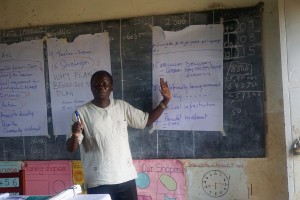 On DAY II, they were ready to get into the details and started off with a SWOT/SCOT (Strengths, Weaknesses/Challenges, Opportunities, Threats) analysis of their school. This is done for specific purpose:
On DAY II, they were ready to get into the details and started off with a SWOT/SCOT (Strengths, Weaknesses/Challenges, Opportunities, Threats) analysis of their school. This is done for specific purpose:
“We want them to see everything in order to make them aware of what is going on how they can use their opportunities to erase their weakness & strengths.”(Richard)
As the ECD centre is only in its nascent stage, it is faced with several challenges andweaknesses, ranging from a lack of classroom, bathing facilities, shades and playing and learning material to high rates of absenteeism in rainy and harvest seasons and rather low 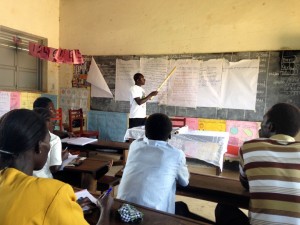 parental involvement. And poverty continues to plague the communities in the region, ultimately representing a threat to the mere maintenance of the nursery. However, they hope to tackle these issues by drawing on their strengths, such as dedicated and qualified teachers, committed CMC members, good enrolment and valuable support of the primary section, and exploiting their ‘opportunities’, may it be through cultivating bare school land for meals for the children or bringing more parents as well as children on board through greater community sensitisation.
parental involvement. And poverty continues to plague the communities in the region, ultimately representing a threat to the mere maintenance of the nursery. However, they hope to tackle these issues by drawing on their strengths, such as dedicated and qualified teachers, committed CMC members, good enrolment and valuable support of the primary section, and exploiting their ‘opportunities’, may it be through cultivating bare school land for meals for the children or bringing more parents as well as children on board through greater community sensitisation.
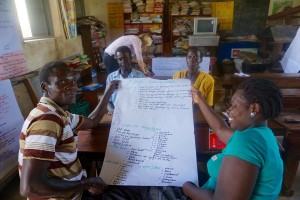 Before everyone was off for the weekend, they started to get to the details, having a look at what resources and expenses will be necessary in order to implement their CDP. Participants were split up into groups. Coincidentally, their results perfectly complemented each other: While the first focused much more on the construction aspect of the SDP, the second prioritised on resources needed inside the classrooms. And once again, they agree on the importance of investing in teacher training. Additionally, their realistic mind-set and awareness of their limited resources inspires them to think practically. For example, when it comes to their constructions plans, they also consider local grass-thatched houses as an alternative.
Before everyone was off for the weekend, they started to get to the details, having a look at what resources and expenses will be necessary in order to implement their CDP. Participants were split up into groups. Coincidentally, their results perfectly complemented each other: While the first focused much more on the construction aspect of the SDP, the second prioritised on resources needed inside the classrooms. And once again, they agree on the importance of investing in teacher training. Additionally, their realistic mind-set and awareness of their limited resources inspires them to think practically. For example, when it comes to their constructions plans, they also consider local grass-thatched houses as an alternative.
The common goal of everyone involved inspires great teamwork and contribution – when Denis, one of the caregivers, addresses the issue of the provision of midday meal by parents, he makes quite a bold move, saying:
“Sometimes you give your children a meal, but you forget about the teachers.”
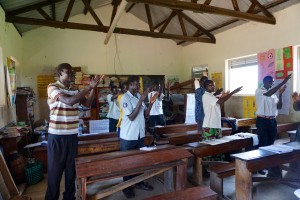 – But the cheekiness is met with great generosity by the attending parents, as they offer to supply the teachers with some land as well as support in the preparation of the land. Filled with motivating appreciation claps for their work, the two-days workshop at St Kizito Bidati ECD centre passed quickly and they look forward to the next workshop, eager to set their CMP into stone.
– But the cheekiness is met with great generosity by the attending parents, as they offer to supply the teachers with some land as well as support in the preparation of the land. Filled with motivating appreciation claps for their work, the two-days workshop at St Kizito Bidati ECD centre passed quickly and they look forward to the next workshop, eager to set their CMP into stone.
From the perspectives of the ‘Juliuses’
Following the workshop, we had the opportunity to talk to a PTA and CMC member who are both called Julius. Find out more about them in the following paragraphs!
Julius #1 – PTA member
We had the opportunity to chat to Julius, a farmer and PTA member at St Kizito Bidati. Four of his five children have already left primary school, but Moses, his youngest, remains and additionally, two of his grandsons, Patience and Emmanuel, from his oldest son, Walter, are currently in K3. Last year, Julius was selected as a PTA member by the community – a position that he has appreciated so far:
“I like it, because I am part of the school, it makes me part of the school. I know how learning is taken place; and above all, my child are also here.”
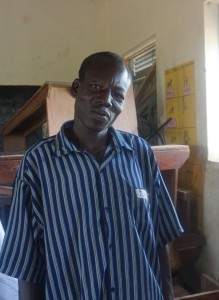 Here is an extract of our feedback-chat:
Here is an extract of our feedback-chat:
What do you think about the performance of the school ?
The school is doing well, but there are certain things that need to be improved on – mostly the parents, who are not doing their part. What do you think of ECD? I am very positive about the ECD, because that is the foundation, for this school to succeed, although there are still challenges with them; there are a few things to be done with the ECD to have that quality.
What do you think of the Jumpstart! project?
For me, the Jumpstart! project is really good, it’s coming to complement what parents are trying to do.
What is best about it?
What I like most about this is the caregivers training, and refresher coursers, the way that teachers are being developed in their skills and are improving each time, because the teachers have demonstrated what they were like before and what they are now. And we, as the management, we were very happy about that. And I think, the impact will go to the children.
What do you think of the workshop?
This workshop is very good. And it wasn’t there before. No one was thinking about it. I now understand the planning – it gives people the opportunity to know what they are supposed to be doing. And I was interested to know more of the different roles of the stakeholders. And I was requesting that such support, if possible, should continue to the leadership of the school, to the management, because it would help them do their work well.
What’s the most important part for you to implement in the CDP?
For me, curriculum delivery is the most important, as well as supporting the teachers, their training and providing the learning materials.
What do you hope for the school?
My hope for this school is to have more caregivers; at least two per class, and this will improve the quality of teaching.
Julius #2 – CMC member
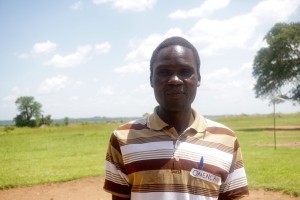 Meet Julius, a 36 year-old farmer from Bidati village in Nyowa district, father of Jacob, Prosie and Fiona, and dedicated member of St.Kitizo Bidati School Central Management Committee ! He was one of the attendees at the two-day Jumpstart! training workshop about developing a Centre Development Plan.
Meet Julius, a 36 year-old farmer from Bidati village in Nyowa district, father of Jacob, Prosie and Fiona, and dedicated member of St.Kitizo Bidati School Central Management Committee ! He was one of the attendees at the two-day Jumpstart! training workshop about developing a Centre Development Plan.
The most important thing that Julius learnt at the training is the importance of planning:
“before the training, the committee was motivated, but not so organised because there was no plan. Now we know who should do what at which time because in the plan everything is detailed – timeframe, goals, responsables, activities. And we are not stopping here – we will meet with other parents to communicate this knowledge.”
Learning how to create action plans has formalised the way the committee works, making them more efficient and productive. Julius is positive that with these new skills, the committee can encourage parents to unite to support the progress of the school.
In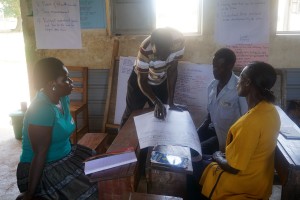 deed, Julius wants to form a committee plan that will raise the standard of education at nursery level, ultimately increasing the quality of teaching and learning and contributing to early childhood development. His belief in the importance of nursery education is based on his own experience as a parent. While his two daughters attended nursery school, his son Jacob did not. The two girls excel at school (Fiona is 1st in her class), often receiving certificates praising their academic performance and organisational skills. However Jacob struggles at school, and has little interest in completing his homework. Julius attributes the educational success of his daughters to their nursery education, which he says helped them to build basic skills and confidence before entering primary level.
deed, Julius wants to form a committee plan that will raise the standard of education at nursery level, ultimately increasing the quality of teaching and learning and contributing to early childhood development. His belief in the importance of nursery education is based on his own experience as a parent. While his two daughters attended nursery school, his son Jacob did not. The two girls excel at school (Fiona is 1st in her class), often receiving certificates praising their academic performance and organisational skills. However Jacob struggles at school, and has little interest in completing his homework. Julius attributes the educational success of his daughters to their nursery education, which he says helped them to build basic skills and confidence before entering primary level.
However, we think that Julius’s dedication to his children’s education has also contributed to this success. He keeps a close eye on his children’s progress both at school and at home, attending ‘lesson day’ each term, a time for parents to attend classes with their children, observe the work scheme and discuss the curriculem with the teachers. Julius regrets leaving school at a young age, so he really values lesson day;
‘I always want to attend, rather than my wife, and sometimes I ask to be set assignments with the children !”
Now that’s dedication ! In the future, he hopes that his children will study hard, but above all “be self-respecting individuals, with careers of their own, who value their jobs”. And he will also do his best to improve the quality of nursery education at Kizito Bidati so that all the students can grow as individuals and have successful careers.
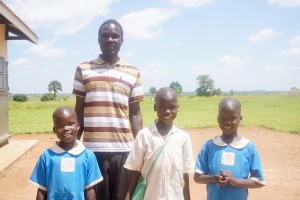
Posted in News |
Tagged Africa, African Revival, ECD, Education, Interview, Nursery, Profile, Pupils, School, School Development, Uganda |
Leave a comment
Posted on September 17, 2015 by Sophie Hicks
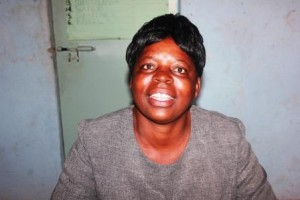 We would love to introduce you to Mrs. Shanachenga, the acting head-teacher of Inkumbi Basic School, located in southern Zambia’s Zimba district. Mrs. Shanachenga lives on the school compound in one of the teachers’ houses with her husband and some of her children, including her youngest, Timothy, who is enrolled in grade 1 at the school. The mother of seven children, Mrs. Shanachenga’s family is rapidly expanding; she already has five grand-children!
We would love to introduce you to Mrs. Shanachenga, the acting head-teacher of Inkumbi Basic School, located in southern Zambia’s Zimba district. Mrs. Shanachenga lives on the school compound in one of the teachers’ houses with her husband and some of her children, including her youngest, Timothy, who is enrolled in grade 1 at the school. The mother of seven children, Mrs. Shanachenga’s family is rapidly expanding; she already has five grand-children!
Mrs. Shanachenga qualified as a teacher in 1994 in Livingstone, and then went on to study for an additional teaching diploma before beginning her teaching career in 1995. Mrs. Shanachenga has been at Inkumbi Basic School for almost two years now teaching Grade 2, and she is also enjoying her new position as the acting head-teacher: “I am enjoying being the acting head-teacher; I am learning a lot. When you are not in administration, you might look and say that it is an easy job, but now that I am in this position, I have learnt that it isn’t easy- there are a lot of challenges but I like it. I would love to be promoted to be a permanent head-teacher one-day!”
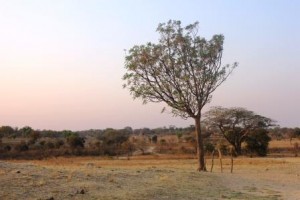
Mrs. Shanachenga loves teaching, but it actually wasn’t her original career choice. However, she just couldn’t ignore her natural aptitude for teaching: “at first I had no interest in teaching, I wanted to work in the government in the Ministry of Defence; I went for interviews but I failed. However, I knew that I had a talent for teaching. That gift was apparent from when I was young…my fellow pupils would ask me to teach them, because I was very good especially in maths and science. After class, if my peers didn’t understand something, they would ask me to teach them, so I would go to the blackboard and explain the lesson to them again. It showed that I was a teacher from birth so it made sense to go into teaching; it was very easy and very natural to me.” It seems that Mrs. Shanachenga has inspired a new generation with her love for teaching, as her oldest daughter will be following in her teaching foot-steps and will be starting teacher-training next year!
Mrs. Shanachenga particularly enjoys teaching younger classes, and loves teaching her grade 2 class and contributing towards their development: “with teaching, what I like most is that you can see how children develop- some children have no problems learning, but others may need help. And once you help them nicely, then they will catch up. I like using my special skills to help all my pupils do well.” Mrs. Shanachenga hopes that with help, her pupils will grow up to “enjoy employment. Once the children are well-educated, mixing with people is easy and they will be able to go anywhere and do anything as long as they have their education.”
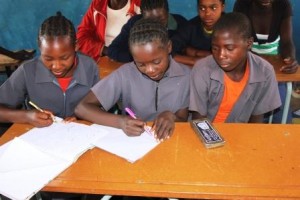
Although it is a rewarding vocation, being a teacher in a rural school admittedly has its fair share of challenges. Mrs. Shanachenga explained them to us: “over-enrolment is a real challenge in the rural set up; all our classes are over-enrolled and we only have 12 teachers for 736 pupils. For example, in grade 2, there are 93 pupils, so it is not easy for me to teach effectively because I need time to spend with children who need extra help. So it is a challenge, especially because we don’t have adequate teaching materials.” In spite of these difficulties, Mrs. Shanachenga and her entire teaching staff work very hard to give the children of Inkumbi the best education possible. With her dedication, we are sure that Mrs. Shanachenga’s pupils will not only excel in school, but also grow up to do great things!
Posted in News |
Tagged African Revival, Changemaker, Education, Headteacher, International Development, Zambia |
Leave a comment
Posted on August 18, 2015 by Elaine Miller
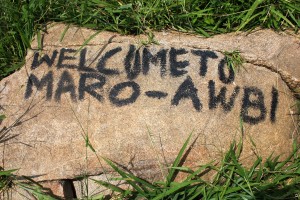 There is more to school than simply books and classrooms. In fact, there are many components which promote a positive school experience, some of which can be easily taken for granted. One such component is hygiene and sanitation; not only are solid hygiene practices, and sanitation structures necessary to maintain good health, they can also help combat wider issues such as student retention in schools.
There is more to school than simply books and classrooms. In fact, there are many components which promote a positive school experience, some of which can be easily taken for granted. One such component is hygiene and sanitation; not only are solid hygiene practices, and sanitation structures necessary to maintain good health, they can also help combat wider issues such as student retention in schools.
This is why we have worked on these issues in some of our schools, including Maro-Awobi Primary School, one of our model schools located in northern Uganda’s Amuru district. When we first began working with Maro-Awobi many years ago, the tiny rural school consisted of one classroom block. However, over the years, we have worked with the school to build two more classroom blocks, a staff room and provided furniture. In addition, we have built three separate latrine blocks (one for teachers, one for boys, and one for girls), two wash and changing rooms, and drilled a bore hole on the school grounds.
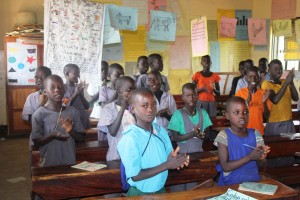
Why did we choose to invest specifically in these areas? Ensuring a fresh supply for water helps facilitate good hygiene practices – such as hand-washing, and cleaning – which can promote the good health of pupils and teachers. In rural schools, un-sanitary practices such as open defecation remains a common issue, which can lead to serious medical repercussions, including cholera. As such, the provision of private latrines is key to promoting the health of students, as well as the wider local community. Moreover, providing gender-segregated toilet facilities reduce instances of sexual abuse in schools, which can led to pregnancies and drop-outs. Indeed, the retention of female students remains a common issue in Uganda.
The investment of washing and changing rooms has proved to be particularly beneficial to Maro-Awobi’s female pupils; in the school’s rural setting, sanitary items are largely unavailable and expensive, and so effectively managing periods is a real challenge. To avoid any potential embarrassment and discomfort, in the past, many girls opted to stay home during their monthly period. Unfortunately, missing so much teaching was detrimental to their learning, and stalled their academic progress.
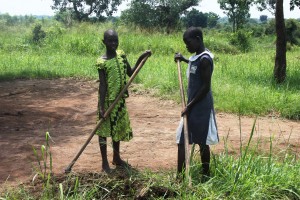 As such, the washing and changing facilities have greatly helped the girls to manage their periods with dignity in a private space, and has thus reduced school absences during this time and in turn, promoted the retention of female students at Maro-Awobi Primary School. The school’s head-teacher, Justine Law, has already found that girls’ drop-out rates are decreasing year on year because of these facilities, and girls’ daily attendance has improved. Justine’s hope, which we wholeheartedly echo, is that through these facilities and frequent community sensitization, all 193 of her female pupils will complete primary school.
As such, the washing and changing facilities have greatly helped the girls to manage their periods with dignity in a private space, and has thus reduced school absences during this time and in turn, promoted the retention of female students at Maro-Awobi Primary School. The school’s head-teacher, Justine Law, has already found that girls’ drop-out rates are decreasing year on year because of these facilities, and girls’ daily attendance has improved. Justine’s hope, which we wholeheartedly echo, is that through these facilities and frequent community sensitization, all 193 of her female pupils will complete primary school.
Posted in News |
Tagged African Revival, hygiene, sanitation, Uganda, WASH, water |
Leave a comment
 Also in a way, its even helping the communities to wipe away gender based violence. You know, most times, if all the family, the husband and wife are involved in the project, this means that they are going to listen to such messages. Because as we train them, there are crosscutting issues that I as a technical person, I do touch. On top of what the project wants from us, after training in the good agricultural practices, after doing the VSLA, there are issues of gender based violence, of HIV prevalence that we always touch upon. So in a way, the parents are all benefitting, and when they get home, they can’t now fight in their house, they can now sit together and plan for their home, plan for their education of their children.
Also in a way, its even helping the communities to wipe away gender based violence. You know, most times, if all the family, the husband and wife are involved in the project, this means that they are going to listen to such messages. Because as we train them, there are crosscutting issues that I as a technical person, I do touch. On top of what the project wants from us, after training in the good agricultural practices, after doing the VSLA, there are issues of gender based violence, of HIV prevalence that we always touch upon. So in a way, the parents are all benefitting, and when they get home, they can’t now fight in their house, they can now sit together and plan for their home, plan for their education of their children. One of the challenges of the SDG is the issue of land dispute. You know, land issues in the Acholi region are not something easy, especially in Langera. During the project launch in the district, one of the committee members of the school just stood up boldly and said ‘I don’t think this project is going to work because in Langera we don’t have so much land’. And that school was already assigned to me, so I felt like ‘how am I going to overcome this?’. But something came into my mind that ‘no you go on, and do what you’re supposed to do, and maybe it can turn out to be a success story’. And when I went for the mobilisation, I found the head teacher who told me, ‘you know what, you don’t have to fear, you just come, the school is there, we are going to work together, and overcome these land issues, and what we are going to do, we are going to sit with these management committees, and make sure we apportion the SDG site to be on the other side where they are wrangling over”. So the parents came, and I used my tricks with the parents to ensure that we succeeded. And the parents were on my side, everything went well, and right now Langera stands to be a success story because there are no more land wrangles, and when the bestseller donor came, the chairperson of the SMC even highlighted that as a success – that the SDG has enabled us to solve the land issues that were in the school. So that wasn’t easy to reach the level we have now.
One of the challenges of the SDG is the issue of land dispute. You know, land issues in the Acholi region are not something easy, especially in Langera. During the project launch in the district, one of the committee members of the school just stood up boldly and said ‘I don’t think this project is going to work because in Langera we don’t have so much land’. And that school was already assigned to me, so I felt like ‘how am I going to overcome this?’. But something came into my mind that ‘no you go on, and do what you’re supposed to do, and maybe it can turn out to be a success story’. And when I went for the mobilisation, I found the head teacher who told me, ‘you know what, you don’t have to fear, you just come, the school is there, we are going to work together, and overcome these land issues, and what we are going to do, we are going to sit with these management committees, and make sure we apportion the SDG site to be on the other side where they are wrangling over”. So the parents came, and I used my tricks with the parents to ensure that we succeeded. And the parents were on my side, everything went well, and right now Langera stands to be a success story because there are no more land wrangles, and when the bestseller donor came, the chairperson of the SMC even highlighted that as a success – that the SDG has enabled us to solve the land issues that were in the school. So that wasn’t easy to reach the level we have now. One of my favourite moments of the project was in Layima Primary School. Layima has been a school where the parents are so so much interested in the project; their numbers have been overwhelming. When you take a project in the community, the expectations are always so high, but we have a budget line that we are supposed to operate within, and it can look quite challenging. At Layima, especially the tools for the beneficiaries – at first this looked like it was a challenge because the numbers were up to 80 members, but there were only 47 hoes. My favourite moment came when we had to sit down with the parents and make them understand that this other support, the tools are just brought to ensure that work starts, but they themselves have to own the project, and if they are willing they can even contribute towards the project by coming with their hoes. And it was an amazing moment when the members agreed that ‘lets first put these hoes intact and use our own hoes’. Even up to now, we’ve not distributed the hoes, and the parents are thinking of giving them to the school, so that the entrepreneurship club can be using it. That was my favourite moment because it felt challenging but a solution was derived.
One of my favourite moments of the project was in Layima Primary School. Layima has been a school where the parents are so so much interested in the project; their numbers have been overwhelming. When you take a project in the community, the expectations are always so high, but we have a budget line that we are supposed to operate within, and it can look quite challenging. At Layima, especially the tools for the beneficiaries – at first this looked like it was a challenge because the numbers were up to 80 members, but there were only 47 hoes. My favourite moment came when we had to sit down with the parents and make them understand that this other support, the tools are just brought to ensure that work starts, but they themselves have to own the project, and if they are willing they can even contribute towards the project by coming with their hoes. And it was an amazing moment when the members agreed that ‘lets first put these hoes intact and use our own hoes’. Even up to now, we’ve not distributed the hoes, and the parents are thinking of giving them to the school, so that the entrepreneurship club can be using it. That was my favourite moment because it felt challenging but a solution was derived. I hope that the project will achieve all its objectives. Looking at the objectives of bringing the parents closer, increasing the retention rates of the pupils in school, ensuring the school feeding program, increasing productivity – with the speed we are going, I hope we will achieve all the objectives.
I hope that the project will achieve all its objectives. Looking at the objectives of bringing the parents closer, increasing the retention rates of the pupils in school, ensuring the school feeding program, increasing productivity – with the speed we are going, I hope we will achieve all the objectives.












 parental involvement. And poverty continues to plague the communities in the region, ultimately representing a threat to the mere maintenance of the nursery. However, they hope to tackle these issues by drawing on their strengths, such as dedicated and qualified teachers, committed CMC members, good enrolment and valuable support of the primary section, and exploiting their ‘opportunities’, may it be through cultivating bare school land for meals for the children or bringing more parents as well as children on board through greater community sensitisation.
parental involvement. And poverty continues to plague the communities in the region, ultimately representing a threat to the mere maintenance of the nursery. However, they hope to tackle these issues by drawing on their strengths, such as dedicated and qualified teachers, committed CMC members, good enrolment and valuable support of the primary section, and exploiting their ‘opportunities’, may it be through cultivating bare school land for meals for the children or bringing more parents as well as children on board through greater community sensitisation.


 Meet Julius, a 36 year-old farmer from Bidati village in Nyowa district, father of Jacob, Prosie and Fiona, and dedicated member of St.Kitizo Bidati School Central Management Committee ! He was one of the attendees at the two-day Jumpstart! training workshop about developing a Centre Development Plan.
Meet Julius, a 36 year-old farmer from Bidati village in Nyowa district, father of Jacob, Prosie and Fiona, and dedicated member of St.Kitizo Bidati School Central Management Committee ! He was one of the attendees at the two-day Jumpstart! training workshop about developing a Centre Development Plan.






